The Rob Crozier Jazz Ensemble is "Live" once again
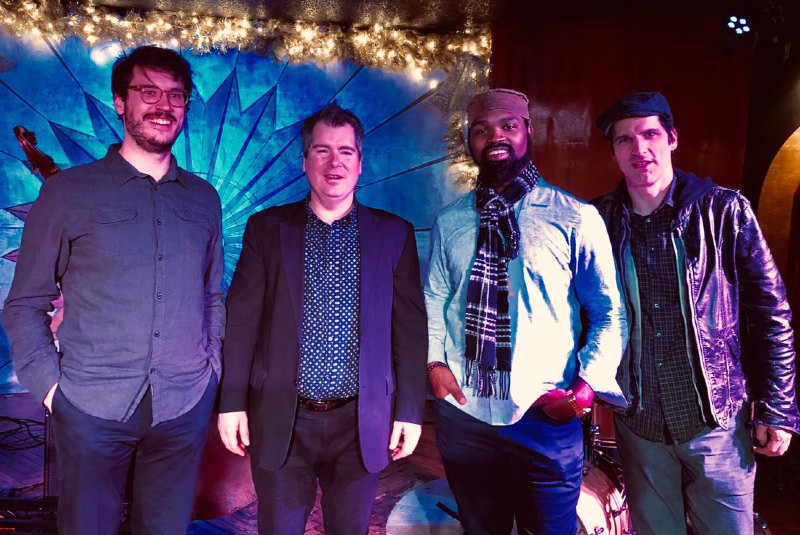
Like most musical groups, the Rob Crozier Jazz Ensemble spent much of 2020 in quarantine due to the pandemic.
But Crozier managed to keep the creativity flowing by digging into live recordings the group made at Grosse Pointe’s Dirty Dog Jazz Cafe in February 2019, and the result is the Ensemble's first live album.
Live is a nice mix of funky fusion, straight-ahead jazz, and world music, featuring tunes from Crozier's last two studio albums, Tall Trees (2017) and Ocean Blue (2018), plus a couple of new songs. For this album, the Ensemble consisted of bassist Crozier, Rafael Statin on reed instruments, pianist/keyboardist Keaton Royer, drummer Rob Avsharian.
Crozier and Co., who were always active playing area stages and festivals before the pandemic, recently started performing again to socially distanced crowds as part of the ongoing series Jazz After Dark at Weber’s Restaurant.
In advance of the album’s release concert at Weber's on September 5, I emailed with Crozier about Live and how he stays creative during the pandemic.
Jazz pianist, Juno Award winner, and U-M professor Andy Milne guides us through his new album, "The reMission"

When jazz pianist Andy Milne moved to Ann Arbor in 2018 to become an assistant professor of music, jazz, and contemporary improvisation at the University of Michigan, he didn't know he would win the 2019 Juno Award for Jazz Album of the Year by a group for The Seasons of Being record with his Dapp Theory ensemble.
But Milne did know he had survived prostate cancer in 2017, so winning Canada’s Grammy equivalent was a nice side note to, you know, being alive.
After recovering from cancer but before moving to Michigan, Toronto-area native Milne, who had lived in New York City since the early 1990s, also started the Unison trio featuring drummer Clarence Penn and bassist John Hébert, composing stripped-down music that is the opposite of Dapp Theory’s fractured-funk polyphony, which features a multitude of instruments and voices. The trio released its debut album, the contemplative The reMission, in April and had planned a tour for May, which the coronavirus pandemic wiped out.
While Milne was disappointed he wasn't able to promote The reMission, he's used the downtime to get acquainted with Ann Arbor now that his wife, the singer and Oberlin College and Conservatory educator La Tanya Hall, was finally able to join him in Michigan.
Plus, he looking forward to diving into what the University of Michigan has to offer in terms of combining his interests in pairing music with science and research.
“I realized when I came here, my primary focus was like, ‘Oh, I’m coming to Ann Arbor to take this teaching position and really embrace a role in the university community,’ both within [the school of] music, theater, and dance and just exploring where my path and where my place would be in the university,” Milne said. “So, I’ve been collaborating with faculty and researchers in different areas of the university for public health and these kinds of things. I’m finding where my zone will be inside of that.”
Combining music with other disciplines has long informed Milne’s work, including Dapp Theory’s The Seasons of Being, which coalesced around ideas he learned while treating his cancer with homeopathy, and the documentary soundtracks he’s composed for Capt. Kirk himself, William Shatner. (The reMission’s “Vertical on Opening Night” is named after something Shatner said in one doc.)
Being at a large research university like Michigan means Milne can continue to explore cross-disciplinary creativity, all in a town he finds welcoming and easy to navigate.
“I think it’s probably just the proximity of everything,” Milne says of Ann Arbor. “The fact that I’m living close to my work, and people are super-friendly here, and there’s great restaurants. I mean, it’s a really livable city, and I’ve been able to get out and enjoy riding my bike and exploring neighborhoods and things like that. I like the feeling here.”
While Milne wasn't able to go out and promote The reMission, he did give us a song-by-song tour of the new album, which you can listen to below on Spotify as you read his commentary.
Jazz From Ann Arbor by Mark Stryker

This story originally ran September 16, 2019.
Mark Stryker will talk about his new book "Jazz From Detroit" at AADL's downtown location on Thursday, September 19, at 6:30 pm. We asked him to recommend some jazz from Tree Town.
Ann Arbor makes a number of cameo appearances in my book Jazz From Detroit. Several recordings highlighted in the text were taped live in Ann Arbor, and a number of the musicians featured in the book have ties to the University of Michigan. (The book itself was published by U-M Press.) Here’s a playlist that takes its inspiration from the Detroit-Ann Arbor jazz connection.
"Creem: America's Only Rock 'n' Roll Magazine" documents how the Detroit-born publication rose to the top
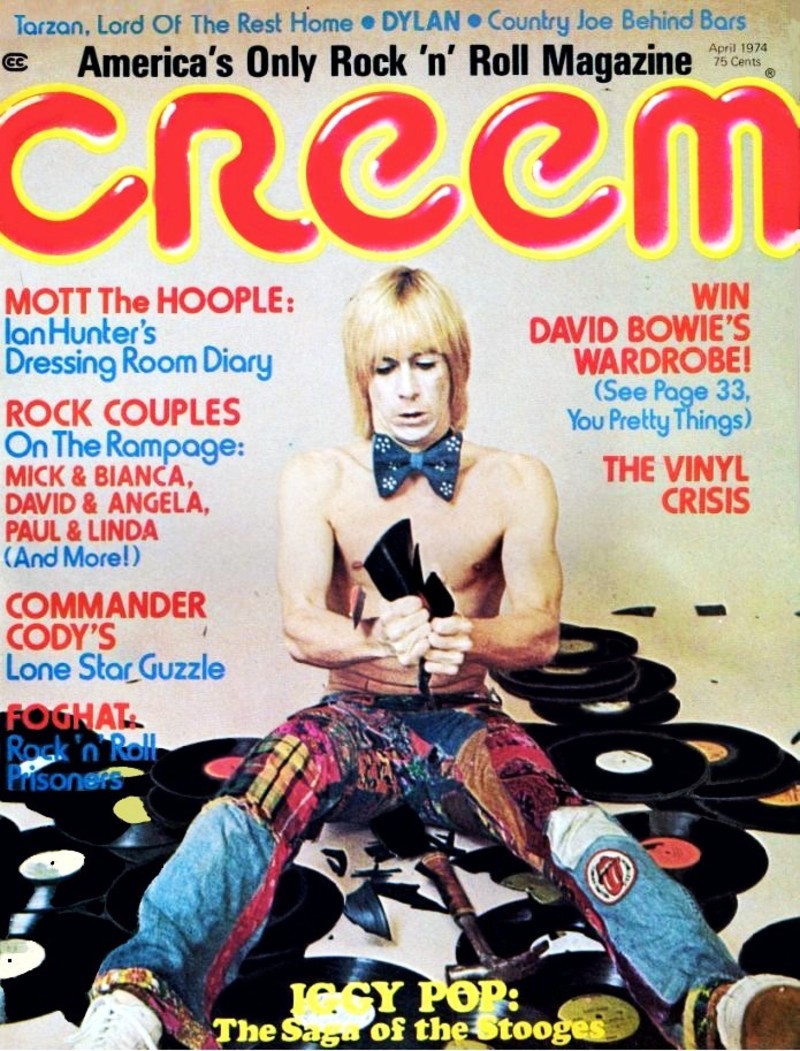
Creem magazine was the 1970s dirty rock 'n' roll branch of The New Journalism practiced in the 1960s by Tom Wolfe, Truman Capote, Hunter S. Thompson, and others. The magazine's salty, raunchy prose and passion-first stance helped crack the egg of music journalism, scrambling it into a form that had as much attitude as the music Creem was covering.
Creem: America's Only Rock 'n' Roll Magazine is a new documentary by Scott Crawford -- director of the essential Salad Days chronicling the D.C. punk scene he grew up with -- that captures the mag's spirit of chaos, tracing Creem's rise and fall with open-eyed honesty.
Started in 1969 from Detroit's Cass Corridor, Creem spent 20 of its 30 years publishing out of Michigan and helped launch the careers of influential music journos Lester Bangs, Dave Marsh, documentary co-producer Jaan Uhelszki, and more. The Creem documentary treats Bangs, Marsh, and cantankerous publisher Barry Kramer as the heart of this dysfunctional band of misfits, many of whom not only covered rock 'n' roll but also lived the lifestyle. Kramer and his wife, Connie, were no exception, and the film's co-producer JJ Kramer deals with his parents' issues with grace during his on-camera interviews.
Before he became a documentary filmmaker, Crawford published numerous fanzines and magazines, including the well-known indie/roots/rock mag Harp, which was influenced by Creem and featured many of its writers. Crawford and I worked for the same company that took over publishing Harp for a few years, and I caught up with Crawford about his latest movie, which is currently available to stream at the Michigan Theater's virtual cinema. This chat was edited for length and clarity.
Midwest Woodstock: Goose Lake International Music Festival celebrates its 50th anniversary
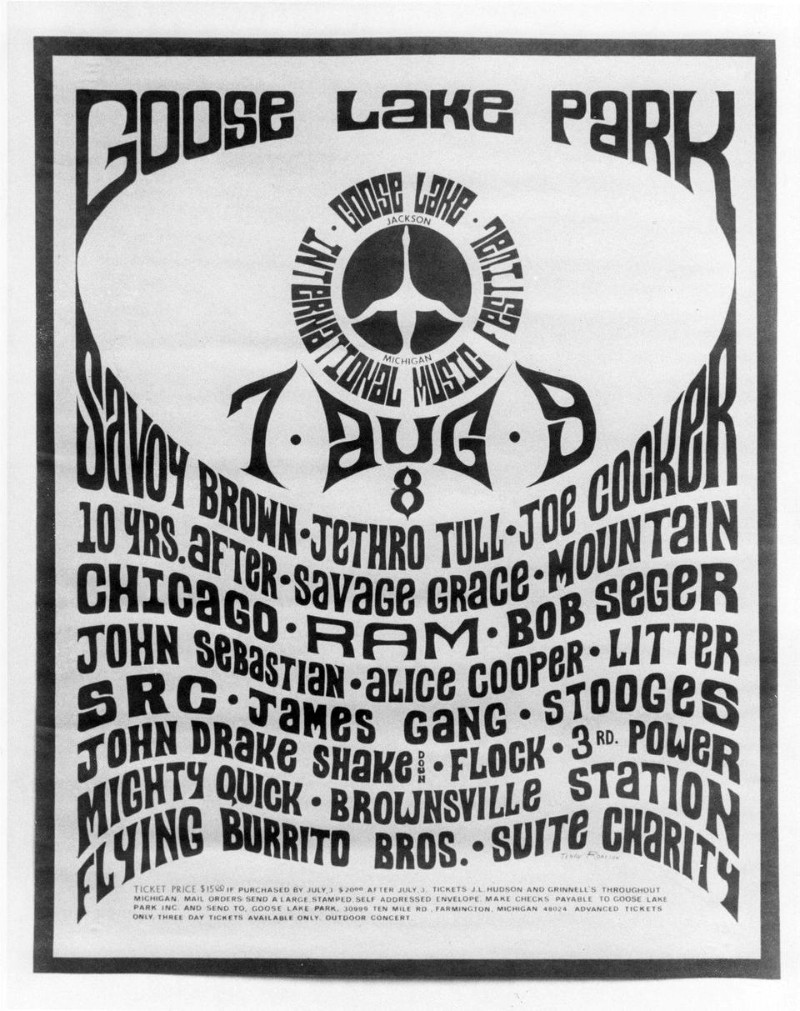
The Goose Lake International Music Festival was the Woodstock of the Midwest.
Between August 7-9, more than 200,000 people traveled from around the country to Jackson County's Leoni Township and set up shop at an otherwise unremarkable lake area where the got to hear some of the biggest name in rock 'n' roll including Jethro Tull, Chicago, Mountain, James Gang, then regional fave Bob Seger, and many more. Alice Cooper, Joe Cocker, and Savoy Brown were slated to play but did not, so the fest added The MC5 and Faces, whose singer Rod Stewart was having such a good time that the band canceled its next gig at the Fillmore East in New York and stayed in Michigan to party.
This weekend marks the 50th anniversary of the Goose Lake fest. It's had a lot of coverage over the years, some of which we've collected below, including two documentaries and a Nerd Nite talk on the festival. But the recent big news about Goose Lake is that Third Man Records unearthed audio from The Stooges' August 8 performance there, which was the last show by the band's original lineup, and have released it on vinyl and CD.
Michigan proto-punk legends James Williamson and Deniz Tek team up for album of raw power

Forsythe Junior High and Pioneer High School grad Deniz Tek made his name as the leader of Australian proto-punk legends Radio Birdman.
James Williamson made his name as the guitarist for Iggy and The Stooges and was co-writer of every song on Raw Power.
But despite their shared love for search-and-destroy guitar riffs, these two Michigan music giants have never recorded together until Two to One, an 11-track album that comes out September 18.
Tek (67) and Williamson (70) sound like young guns on the album's first single, "Stable."
Jesse Kramer's "Antinous as Osiris" interprets Roman passion and New York jazz through the lens of a Washtenaw County upbringing

This story originally ran June 12, 2019.
For roughly half a decade, the Roman emperor Hadrian was in love with a man who was not his spouse. Between 125 CE and 130 CE, the Greek youth Antinous became a favorite of Hadrian, and for the final two years of the latter's life they were side by side touring the Roman empire.
After Antinous' surprise death on the Nile, Hadrian was devastated and, in his grief, proclaimed his lover a deity, In turn, priests connected Antinous to the Egyptian god Osiris, lord of the underworld, afterworld, and rebirth.
Et voilà:
Nearly 2,000 years later we have Antinous as Osiris, the latest album by Ann Arbor jazz drummer Jesse Kramer.
Open to all 9-12th graders, U-M's Girls in Music & Technology summer camp goes virtual this August
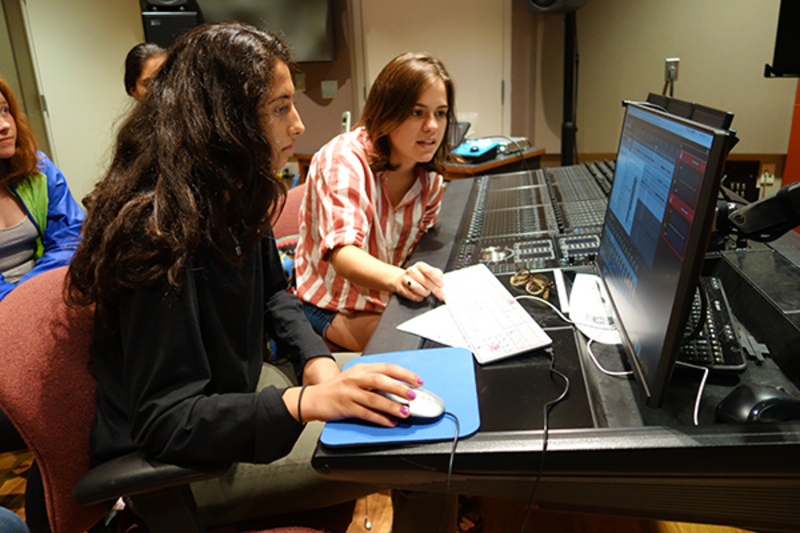
Summer camps, like the rest of society, were put in disarray due to the Covid crisis.
But some summer camps were able to recast their normal activities into virtual ones and stay open.
The University of Michigan's Girls in Music and Technology (GiMaT) runs August 17-28 is one of those camps, and because of its focus, GiMaT will likely be one of the more successful transitions to the virtual world. After all, who better to run a virtual tech and music camp than actual tech experts?
GiMaT is for students in grades 9-12, and the "camp is open to students of all gender identities, and is designed to encourage and support campers who wish to explore musical applications of technology."
U-M Faculty Director Dr. Zeynep Özcan, who makes brilliantly brainy electronic music, will guide students in understanding the musical applications if technology, with help from U-M School of Music, Theatre & Dance Department of Performing Arts Technology faculty. The program overview includes:
Legendary Ann Arbor luthier Herb David passes away

On July 26, David Siglin, the former director of The Ark, announced on his Facebook page the death of legendary Ann Arbor luthier Herb David:
I am very sad to report that Herb David died last night. Herbie was one of a kind, unique in every way. He was a very important influence on me and my love for folk music. I feel strongly that, if not for Herb and Herb David Guitar Studios, The Ark would have come and gone in the late 1960s or early 70s. But more than anything, he was a dear friend and I'm going to miss him greatly.
David was 89. (His birthday was April 11 and a February 1991 Ann Arbor News article lists him as 59 then.)
Originally from Chicago, David learned his trade at age 25 from a Detroit shoemaker named Sarkis "Sam" Varjebedian, who also repaired stringed instruments in his shop. They met because David had taken his own guitar there for repair. When Varjebedian died, David bought his tools, some of which were more than 300 years old and passed down generations in the family. Remarkably, David grew up playing the trumpet and never touched a guitar until a fellow soldier gave him a few lessons in the Army, which he enlisted in after graduating from Michigan State University.
According to this 1963 "local man" article in The Ann Arbor News, David left his career as a research psychologist at Henry Ford Hospital in Detroit at the age of 30 to begin his career as a luthier. David told the News:
Saturday Looks Good to Me discovered some live gems during lockdown
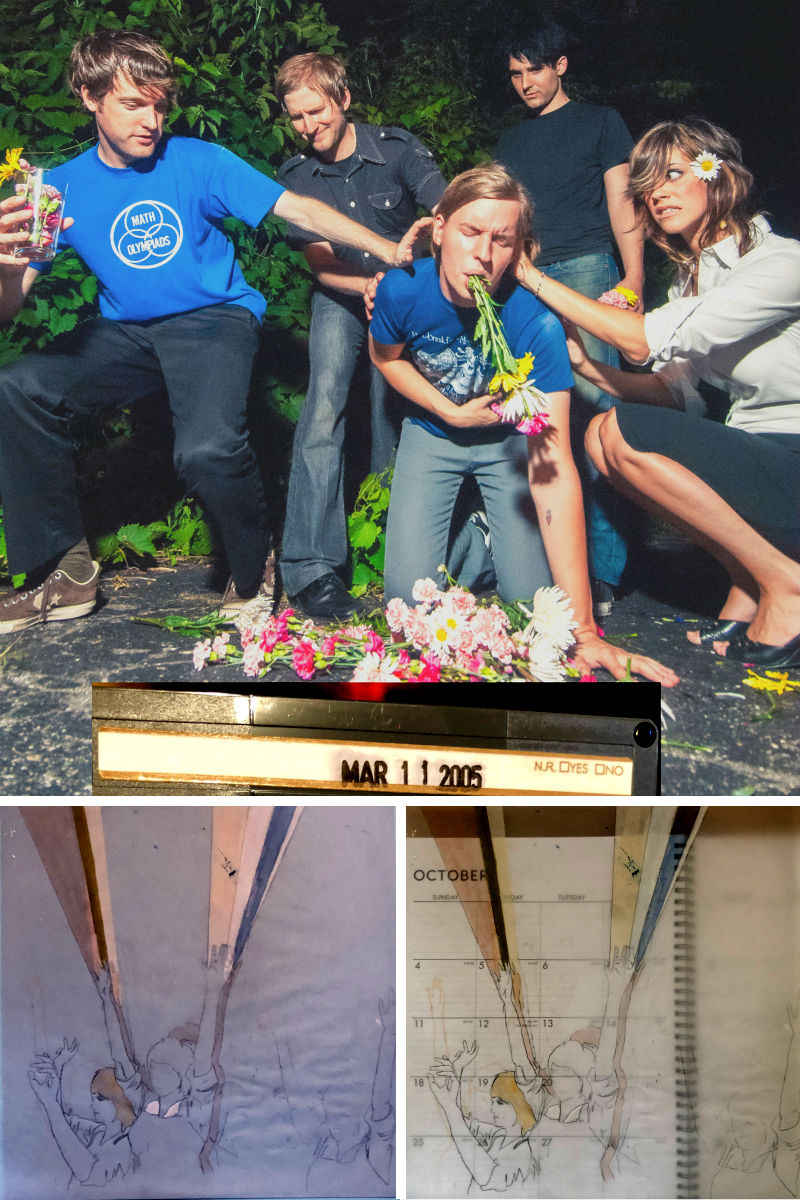
Back in April, Saturday Looks Good to Me singer/songwriter/guitarist Fred Thomas was using some of his quarantine lockdown time to explore piles of cassettes he had featuring all manner of music from his various projects.
"I found this cassette that simply said 'Mar 11 2005' and was amazed to discover it was a show from one of Saturday's dreamier configurations during our peak touring times," Thomas wrote on the Bandcamp page featuring the live recording now titled March 11, 2005 • Champaign.
The "dreamier" Saturday sound on this tour -- compared to its more typically rollicking indie rock -- happened because Thomas didn't remember that drummer Steve Middlekauff couldn't come along for the tour until the night before. But rather than try to rope in a percussionist at the last minute, the group switched gears and adapted to the drummerless tour on the fly.


































